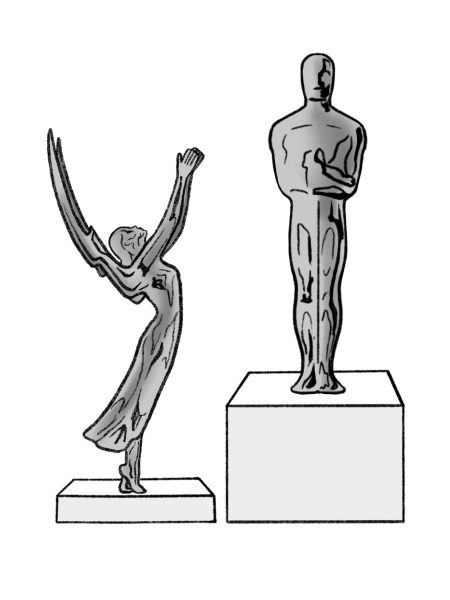“I…needed a job. I am being so serious,” replied Rachel Zegler in an interview with The Hollywood Reporter, explaining her decision to take the role of Anthea in Shazam 2. The endless comments under this video of Zegler were filled with statements like, “She sounds desperate,” or “Rachel is such an ungrateful brat.” Other celebrity news outlets and endless Hollywood fans have expressed their disapproval of the new public figure, questioning the abilities of her publicist and even going as far as to claim that she is unpassionate. Meanwhile, on the other side of the spectrum, male actors like Jacob Elordi, Robert Pattinson and Hugh Grant have received vastly different reactions. When commenting on his latest production of Saltburn to an Indie Wire reporter, Elordi stated,
“I just play what they give me. You know, I need a job.” The consequences of Elordi’s actions drastically differed from Zeglers’s, gaining praise with comments like, “That was so real of him,” or “Valid.” For centuries in Hollywood, women have always been a step below men and have fought desperately to catch up, yet they have continued to fall short when it comes to the praise of viewers. These differing reactions to comments made by actors and actresses discourage women from sharing their opinions and feelings. This will continue to limit what women feel comfortable saying in interviews with media outlets.

According to a Pew Research survey, when asked about traits most valued in each gender, 30 percent said they valued kindness in women, while 11 percent of people said they valued the same traits for men. Because of this bias towards women, their comments, especially in the media, are much more critically examined than comments from male actors, especially if they come off as insensitive. These heightened expectations of women create a double standard in the industry to always be courteous and not stand up for themselves, even if they are simply stating their beliefs or doing their job. In an interview with The Independent, Mindy Kaling, actress, director and producer, expressed her experience with the double standards she faces as a director.
“As a leader and employer in my shows, I think of myself as incredibly direct, very decisive and also impatient. Which you need to be, you know the pace of TV, you know how quickly things have to work,” Kaling said. “Those are [qualities] that in men [people appreciate], you’re like ‘thank you’” Kaling said. “But in a woman, those qualities are so ugly to certain people.”
Double standards and expectations of viewers of celebrities and people in the Hollywood industry can be summed up perfectly by Taylor Swift. Swift, who has repeatedly written songs about her exes in her career, receives a great amount of backlash from listeners. In an interview on the Australian podcast, Jules, Merrick & Sophie, Swift states, “You’re going to have people who are going to say, “Oh, you know, she just writes songs about her ex-boyfriends.” And I think frankly that’s a very sexist angle to take. No one says that about Ed Sheeran. No one says that about Bruno Mars. They’re all writing songs about their exes, their current girlfriends, their love life, and no one raises the red flag there.” The expectation for women in the eyes of the public to act perfectly, not to be ungrateful for their opportunities or act hatefully, in general, is a standard that must be broken.
Because these standards don’t get very much media attention, many believe it is performative, and that the issue is not as big as others make it out to be. In reality, countless actresses are expected to act and perform a certain way offstage. These double standards do not get as much attention because their argument attacks one of the biggest industries in the world. For example, the #MeToo movement started in 2006 but didn’t pick up steam until 2017. For years women have dealt with sexual assaults and felt invalidated and under-represented. In order to not make the same mistake of delaying attention to the issue, the misogynistic lens society uses to look into the actions of female celebrities must be recognized and eventually stopped. As a society, we must equivocate the actions of both men and women without marginalizing one gender.







